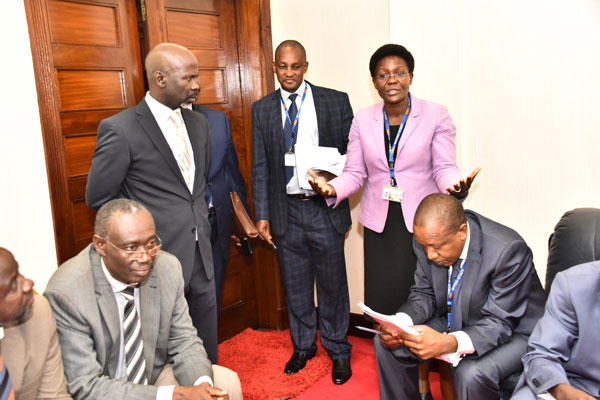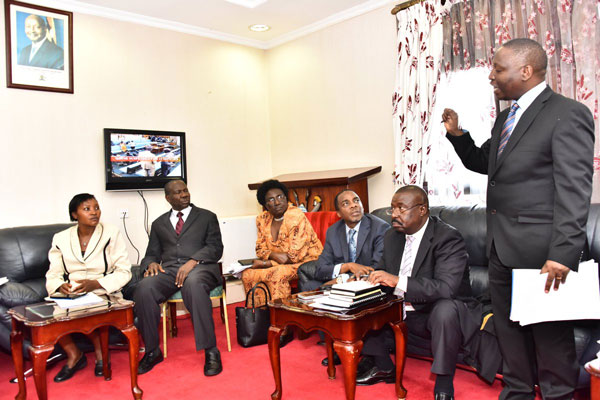
Budget provided biggest share of Sh4.6 trillion to the works and transport sector representing 21%.
The Sh29 trillion national budget approved by Uganda’s Parliament on Wednesday provides its biggest share to the works and transport sector with an allocation of sh4.6 trillion representing 21%.
While presenting the financial year 2017/2018 Budget Committee Report, Amos Lugoloobi (Ntenjeru North) stressed that the budget was structured to improve service Delivery, address current and medium term challenges
Who takes what?
The national budget that will be read by the minister of finance, planning and economic development Matia Kasaija on June 8, 2017 at Serena hotel, Kampala provides its biggest share to the works and transport sector with an allocation of Sh4.6 trillion representing 21%.
The second biggest share of the national budget goes to the repayment of loans whose interest rates are due and Sh2.6 trillion has been allocated standing at 12.1% of the total budget.
The education sector takes 2.4 trillion shillings while agriculture is taking Sh863 billion which is only 3.9% contrary to 10 % that should have been allocated according to the Maputo Declaration on Agriculture and Food Security in Africa
In 2003, Uganda was among the many Africa states that committed themselves to allocating at least 10% of their national budgets to agriculture.
Sh2.3 trillion shillings has been allocated to the energy and mineral development sector, Sh 1.8 trillion
for health while public sector management and security take a share of Sh1.4 trillion each.
The sector with the lowest budget allocation is science and technology with Sh66.8 bn which represents 0.30% followed by Tourism, trade and industry with 98bn representing 0.45% and ICT with 106bn representing 0.48bn respectively.
Budget priorities
The report indicates that the FY2017/18 budget will focus on increasing agriculture production and productivity for food security and strategic exports, enhancing private sector development for promotion and import substitution.
It will further focus on intensifying energy and transport infrastructure development, to lower production costs and completing oil related infrastructure development to enable commercialization and the first oil output in 2020.
The budget is also aimed at increasing affordable long-term credit, to finance private sector investment, improving service delivery through Human capital development, intensifying the fight against corruption and boosting domestic revenue mobilization.
In its report, the Budget Committee noted that while domestic borrowing is set to increase by 175.7%; budget support will instead decline by 96.2%. During the next financial year, the external financing will increase by 8.5% compared to the current financial year.
The Committee however, noted a decline by4.1% in the resource envelope for annual budget FY 2017/18, compared to what was provided under the National Budget Frame Work Paper. The committee also expressed concern, over the decline in domestic debt refinancing and project support.

Revenue measures
In the new financial year, the Committee noted that domestic revenues including grants are projected to increase by 18.06%, against the projected revenues of FY 2016/17.
Presenting the report, Lugolobi, the Budget Committee Chairperson noted that in the FY 2017/18, domestic revenue collections, are projected at sh16, 69b, of which tax revenue is Sh14, 682b, non-tax revenue is Sh380b and grants sh1, 636b.
The projected revenue is equivalent to 15.2% of GDP against 14.42% of GDP in the FY2016/17.
Public debt accumulation
In its report, the committee noted that the government has continued to contract public debt in order to finance infrastructure gaps specifically in the energy and transport sectors.
According to the committee, as at end of December 2016, Uganda’s total public debt stock amounted to $8.7b, of which $5.468b of total debt stock is domestic debt. “Although the debt sustainability analyses indicate a low risk of debt distress for Uganda, the rate at which public debt stock is accumulating, points to increasing vulnerabilities to the country,” Lugolobi said.
The MPs recommended that the Government scales down and eventually discourage domestic borrowing, and also create an agricultural bank, to effectively intermediate and support private sector growth, saying the current arrangement through the agriculture financing facility of commercial banks is not effective.
MPs disagree
In her minority report, which was rejected by parliament, Cecilia Ogwal (Dokolo woman Mp), a member of the Budget committee, also Parliamentary Commissioner, raised concerns about excessive domestic borrowing.
In the FY2017/18, Government seeks to borrow funds worth Sh4.99 trillion for Treasury Bills far above Sh1.5 trillion, which is the legal threshold of 10% of the domestic revenue of government of Sh1.5 trillion.
According to Hon. Ogwal, this is illegal since it violates the provisions of the public finance management Act. Section 36(5a) of the Public Finance Management Act, as Amended, stipulates that loans, raised for treasury operations, shall not exceed 10% of the domestic revenue of government.
Section 36 (5b) of the Public Finance Management Act, defines Treasury Operations to mean day to day management of Government cash needs by undertaking annual, quarterly and daily cash forecasts for investments and temporary borrowing, that government has sufficient liquidity to meet its obligations on time in line with the parliamentary appropriations.
MPs questioned the proposed 4.99 trillion saying it should not be included in the budget. However Finance Minister Matia Kasaija explained that the money was needed to finance day to day operations of the Government in case of a deficit in the budget.
What was passed eventually
The total proposed annual budget for the financial year 2017/18, originally submitted to parliament by the Minister For Finance on March 29, 2017, amounted to Sh28.9 trillion of which Sh19, 065.4b (65.8%) was for appropriation and Sh9,925.2b (34.2%) was for statutory expenditure.
However on May 18, the Minister For Finance, submitted a corrigenda to the draft estimates which revised the total proposed annual budget for FY 2017/18 to Sh29, trillion.
The Budget Committee in its report stated that in the 2017/18, the overall fiscal deficit is projected at sh5.606bn (5.1% of GDP) which will be financed by borrowing externally (UGX.4527bn) and domestically (UGX.1, 079bn). The domestic borrowing will increase by UGX.596bn from UGX 4.83bnn in FY 2016/17.
According to the budget committee report that was adopted by parliament after a heated debate by Mps, out of the Sh29 trillion budget, Sh7.trillion will go towards recurrent budget, Sh11.4 trillion towards the development budget and Sh 9.9trillion towards statutory expenditure.
****
Finance Minister Kasaija convinces Uganda parliament to pass Shs29 trillion 2017-18 budget https://t.co/NnVWpuQjwB pic.twitter.com/yTieVbZK4i
— The Independent (@UGIndependent) May 31, 2017
 The Independent Uganda: You get the Truth we Pay the Price
The Independent Uganda: You get the Truth we Pay the Price




Lets just wait for 8 June but the practical effect is already hitting the economy…
If a match box is now at 200/=, then what else can you explain.
FOR GOD AND MY COUNTRY.